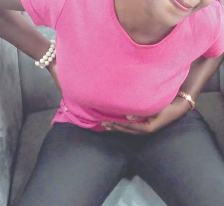Some girls get embarrassed at the onset of menstruation due to lack of prior knowledge on the subject.
“It was the most embarrasing moment of my life. I had walked to the board when I was in form one to solve a mathematical equation and suddenly , I heard an outburst of laughter in class. My gown was blood-stained. I was confused. I didn‘t know it was menstruation. That it was the first experience, ” Loana Ngum, 24, a business woman in Douala explains.
Loana Ngum is not alone with such experience; world-wide,many girls have their first period before their parents talk to them about it.
This is because periods have long been assosciated with shame ,secrecy and misinformation largely due to prevailing conservative cultural attitudes.
Monthly, millions of adolescent girls around the world-wide face a cycle of pain, discomfort, shame, anxiety or isolation during menstruation. But menstruation occurs as part of a woman‘s monthly cycle.
If a woman does not become pregnant, her uterus or womb sheds its lining sending out blood through the vagina. Many girls start seeing their period between the ages of 11 and 15, even though some can start earlier. Some stop seeing their period around the age of 45 with the onset of menopause. There is no need for a girl to panic or feel embarrassed because it is an essential process for every woman.
The onset of menstruation is one of the most important changes that occur in adolescent girls. Funny enough most parents are uncomfortable talking with their daughters about it . “You know it‘s not easy to talk about such . I‘m also very busy. Besides, I believe that their biology teacher is better placed to explain to her in school, ” Florence Akwi, a fish vendor in Muea Market, explains.
Most girls fear to talk to their parents about the onset of their period because of stories told by their friends. Consequently, they are unable to get the assistance they need to manage their menstrual health right from the beginning.
“My friends had told me that periods are an indication that a girl has become sexually active. So when my period started I was scared and instead decided to hide it from my mom. Till date my mom and I haven‘t discussed anything about menstruation, ” reveals Efeti Solange ,20, second-year Linguistic student in the University of Buea.
Menstrual practices are still clouded by taboos, myths and socio-cultural restrictions.In some countries,menstruation is still regarded as something unclean. The reaction to menstruation depends upon awareness and knowledge about the subject. Lack of information about it leads to misconceptions and discrimination– and can cause the girls to miss out on normal childhood.
Some people believe that during periods girls are impure and should not be allowed to visit or cook. Others restrict women from prayers and holy books.
Hygiene-related practices of women during menstruation are important as it has a health impact in terms of the increased vulnerability to reproductive tract infections.
“It is important to be hygienic during menstruation, to prevent infection of the reproductive tract, ” Yvette Bende, 26, cautions. Midwife Educator at St Louis University Institute, Buea.
In 2014, the UN declared that menstrual hygiene was a public health issue. Poor hygiene can also lead to future infertility and birth complications. Menstrual hygiene deals with specific healthcare needs and requirements.
A menstruating woman should change her pad every four hours during the day and bathe thoroughly with clean water. Women should keep their menstrual records,which could assist in assessing their health. Women should avoid using scented products because the vagina is self-cleansing .
Before discarding used pad, it should be wrapped very well to ensure that the smell and infection are contained. During periods, it is adviceable to wear breathable dresses.
With the high population of women using menstrual products, multinationals are making millions of money from their sales as they produce low quality absorbing material. The use of these materials irritatate the vaginal and can even cause cervical cancer.
Many women have no access to proper hygiene resources and the support they need for their periods.
To effectively manage their menstruation, girls and women require access to water, sanitation and hygiene facilities. A good number of women use pads or sanitary napkins, tampons, menstrual cups and period underwears during their flow. Female hygiene products generate billions of money yearly from the countless number of products they have on the market.Even with the presence of these products on the market, women in villages and smaller towns still prefer to use reusable products and toilet paper because they are cheaper than the others.
However, inadequate use of these reusable products may lead to growth of bacteria, which is very harmful to women.
Girls need appropriate menstrual hygiene materials, information on good practices, and a supportive environment to take care of where menstruation without embarrassement or stigma.




